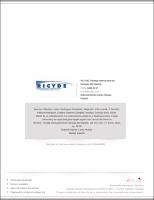Please use this identifier to cite or link to this item:
https://repositorio.usj.es/handle/123456789/568
| Title: | Efecto de un calentamiento con estiramientos estáticos y dinámicos sobre el salto horizontal y la capacidad para repetir esprint con cambio de dirección |
| Other Titles: | Effect of warm-up with static and dynamic stretching on the horizontal jump and repeated sprint ability with changes of direction |
| Authors: | Sanchez-Sanchez, Javier


Rodriguez-Fernandez, Alejandro 


Vicente, Jose Gerardo Villa 


Petisco-Rodríguez, Cristina 

Ramirez-Campillo, Rodrigo 


Gonzalo-Skok, Óliver 

|
| Keywords: | Deporte de equipo; Fatiga; Postactivación potenciación; Rendimiento; Calentamiento; Team sport; Fatigue; Postactivation potentiation; Performance; Warm-up |
| Issue Date: | 2016 |
| Publisher: | Ramón Cantó Alcaraz |
| Citation: | Sánchez-Sánchez, J.; Rodríguez-Fernández, A.; Villa-Vicente, G.; Petisco-Rodríguez, C.; Ramírez-Campillo, R., y Gonzalo-Skok, O. (2017). Efecto de un calentamiento con estiramientos estáticos y dinámicos sobre el salto horizontal y la capacidad para repetir esprint con cambio de dirección. RICYDE. Revista internacional de ciencias del deporte. 47(13), 26-38. http://dx.doi.org/10.5232/ricyde2017.04702 |
| Abstract: | El objetivo de este trabajo ha sido comparar el efecto de tres calentamientos diferentes (calentamiento aeróbico de baja intensidad, estiramiento estático y estiramiento dinámico) sobre el salto horizontal y la capacidad de repetir esprint con cambios de dirección. Diecisiete practicantes de deportes de equipo de 20.8±1.1 años realizaron 3 tipos de calentamiento (10 min): ejercicio aeróbico sin estiramiento (CAE), con estiramiento estático (CAES) y con estiramiento dinámico (CAED). Se estudió el efecto agudo de cada calentamiento sobre el rendimiento en una prueba de salto horizontal (SH) y un test de repetición de esprint con cambio de dirección (RSCOD). No se obtuvieron diferencias significativas (p>0.05) en ninguna de las variables en función del calentamiento realizado. El tamaño del efecto (TE) indicó que probablemente el RSCODmejor sea más sensible al CAE que al CAES (TE: 0.52) y al CAED (TE: 0.44). El escaso efecto de los estiramientos estáticos sobre el rendimiento en SH y RSCOD puede ser debido a la dosis, la intensidad y el tiempo de recuperación empleado. Los estiramientos dinámicos no mejoraron el rendimiento en SH y RSCOD. |
| Description: | The purpose of this study was to compare the effect of three different warm-ups (low intensity aerobic warmup, static stretching and dynamic stretching) on the horizontal jump and repeated sprint ability with changes of direction. Seventeen players of team sports whose age was 20.8±1.1 years old performed three types of warm up (10 minutes): aerobic exercise without stretching (WU), with static stretching (WUSS) and with Dynamic stretching (WUDS). The acute effect of each warming over performance was studied in a test of horizontal jump (HJ) and repeat sprint test with change of direction (RSCD). No significant differences were obtained (p>0.05) in any of the variables studied according to the warming developed. The effect size (ES) indicated that probably RSCDbest was more sensitive to WU than WUDS (ES: 0.52) and WUDS (ES: 0.44). The limited effect of static stretching on SH and RSCOD may be due to the dose, intensity and recovery time. The dynamic stretching did not improve performance in HJ and RSCD. |
| URI: | https://repositorio.usj.es/handle/123456789/568 |
| ISSN: | 1885-3137 |
| Appears in Collections: | Artículos de revistas |
Files in This Item:
| File | Description | Size | Format | |
|---|---|---|---|---|
| Efecto de un calentamiento con estiramientos estáticos y dinámicos sobre el salto horizontal y la capacidad para repetir esprint con cambio de dirección.pdf | 431,4 kB | Adobe PDF |  View/Open |
This item is licensed under a Creative Commons License

